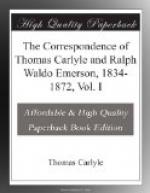------------ * In his Life of Sterling, Carlyle prints a letter from Sterling to himself, dated Bordeaux, October 26, 1836, in which Sterling urges him to come “in the first fine days of spring.” It must have reached him a few days before he wrote this letter to Emerson. ---------
I ought to say, however, that about New-year’s-day I will send you an Article on Mirabeau, which they have printed here (for a thing called the London Review), and some kind of Note to escort it. I think Pamphlets travel as Letters in New England, provided you leave the ends of them open: if I be mistaken, pray instruct Messrs. Barnard to refuse the thing, for it has small value. The Diamond Necklace is to be printed also, in Fraser; inconceivable hawking that poor Paper has had; till now Fraser takes it—for L50: not being able to get it for nothing. The Mirabeau was written at the passionate request of John Mill; and likewise for needful lucre. I think it is the first shilling of money I have earned by my craft these four years: where the money I have lived on has come from while I sat here scribbling gratis, amazes me to think; yet surely it has come (for I am still here), and Heaven only to thank for it, which is a great fact. As for Mill’s London Review (for he is quasi-editor), I do not recommend it to you. Hide-bound Radicalism; a to me well-nigh insupportable thing! Open it not: a breath as of Sahara and the Infinite Sterile comes from every page of it. A young Radical Baronet* has laid




